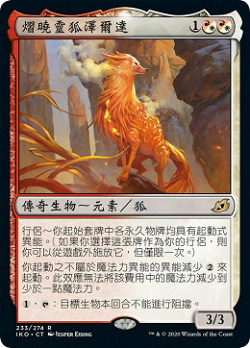规则
01/06/20
If you reveal a companion outside the game, for as long as it remains there, you may pay any time you could cast a sorcery (that is, you have priority during your main phase and the stack is empty). Once you do, you put it into your hand and behaves like any other card you’ve brought into the game. For example, if it’s discard, countered, or destroyed, it’s put into your graveyard, remaining in the game. This is a change from previous rules.
17/04/20
Activating Zirda’s last ability after a creature has blocked won’t remove the blocking creature from combat or cause the creature it blocked to become unblocked.
17/04/20
An activated mana ability is one that produces mana as it resolves, not one that costs mana to activate.
17/04/20
Before shuffling your deck to become your library, you may reveal one card from outside the game to be your companion if your starting deck meets the requirements of the companion ability. You can’t reveal more than one. It remains revealed outside the game as the game begins.
17/04/20
If more than one player wishes to reveal a companion, the starting player does so first, and players proceed in turn order. Once a player has chosen not to reveal a companion, that player can’t change their mind.
17/04/20
Paying to put your companion into your hand is a special action. It doesn’t use the stack and players can’t respond to it. Once you take this action, you may cast that card if it’s legal to do so before any other player can take actions.
17/04/20
Permanent cards are artifact, creature, enchantment, land, and planeswalker cards. Land cards with basic land types have intrinsic activated mana abilities associated with those types.
17/04/20
The companion ability has no effect if the card is in your starting deck and creates no restriction on putting a card with a companion ability into your starting deck. For example, Zirda may be in your starting deck even if your other permanent cards don’t all have activated abilities.








— 评论0
成为第一个发表评论的人